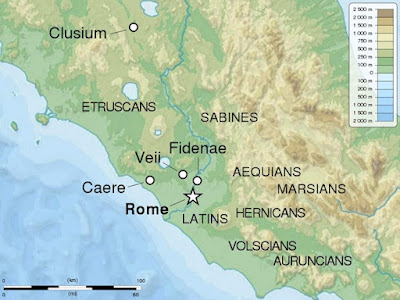Aequī, quī in parte Latiī habitābant, bellum contrā populum Rōmānum gerēbant. Aequī Minucium, cōnsulem Rōmānum in valle angustā obsīdēbant; itaque perīculum [1] Rōmānīs erat magnum. Inde Rōmānī nūntiōs ad Cincinnātum mīsērunt. Ubi nūntiī pervēnērunt, Cincinnātus in fundō parvō arābat. Rōmānī Cincinnātum, quī ad oppidum statim vēnit, [2] dictātōrem creāvērunt.
[1] Rōmānīs (dative plural): for the Romans.
[2] dictātor, dictātōris [3/m]: dictator (from dictō, -āre, -āvī [1]: to say often / repeat / assert); the noun did not have the negative meaning that it does now. A dictator was originally an emergency legal appointment in the Roman Republic, the position given to a Roman magistrate for a limited duration.
____________________
The Aequi, who lived in a part of Latium waged war against the Roman people. They were besieging / blockading Minucius, a Roman consul, in a narrow valley; therefore, the danger for the Romans was great. From there the Romans sent messengers to Cincinnatus. When the messengers arrived, Cincinnatus was ploughing on a small farm. The Romans made Cincinnatus, who immediately came to the town, dictator [can be reworked: they made Cincinnatus dictator and he immediately came to the town].
____________________
https://en.wikipedia.org/wiki/Aequi
Statue of Cincinnatus holding the fasces at his plough in
Cincinnati, Ohio
fasces: a bound bundle of wooden rods often containing a protruding axe and symbolising judicial power















